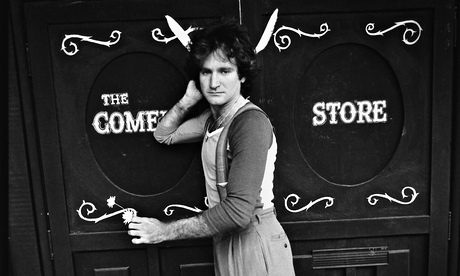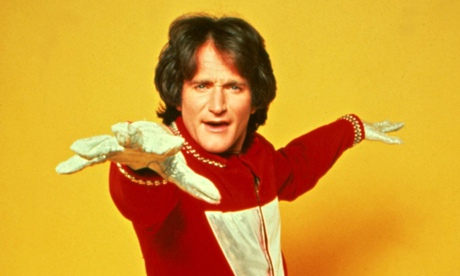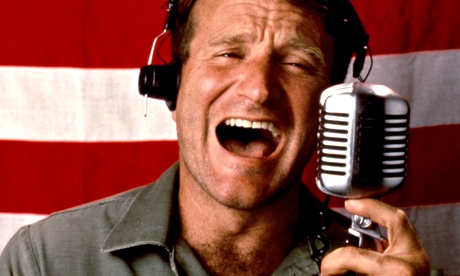
Robin Williams clowning around outside The Comedy Store in 1978. Photograph: Wynn Miller/The LIFE Images Collection/Getty
There were two dividing impulses in Robin Williams's performances that could, roughly, be called his American and British sides. On the American side, there was the slushy tendency towards sentimentality, for which he became increasingly known, which, at its best, resulted in Dead Poets Society, The Birdcage and Mrs Doubtfire, and, at its worst, became Patch Adams and Old Dogs. Hollywood has long had a tendency to adopt the finest and most interesting comedians and then determinedly blunt the hard edges that make them interesting. Along with Richard Pryor, Williams was the most obvious example of that.
Then there was what could be called Williams's British side, although I suspect British people would be somewhat flummoxed by that description. "His humour is already reminiscent of the great British comedians," the MC at the Improv in LA crowed in 1977, introducing Williams for one of his earliest televised standup performances. What the MC meant, of course, was that Williams'scomedy was weird. It was also sharp and a little scary. It was manic, in other words, and only someone extremely talented and very smart could pull it off without it all falling to pieces, and Williams was both of those things to the day he died. When he appeared as a guest on The Daily Show last year, he was his usual free-wheeling, wide-ranging self, slipping in and out of voices while also talking candidly about rehab. His voice sounded a little heavier, and there was a weary "All right, all right, let's give them what they want" look in his eyes, which at the time I put down to age and fatigue. But he was, nonetheless, hysterically funny, and he reduced Jon Stewart to speechless laughter, just as he did David Letterman 20 years ago and Johnny Carson (who chose Williams to be the last comedian to appear on his show) 30 years ago.
When a next-to-unknown Williams appeared at Richard Pryor's Roast in 1977, sporting a truly terrifying suit, Pryor laughed so much he looked like he was crying, and it's hard to think of a higher accolade a young comedian in the 1970s could get.
Williams could certainly do drama without descending into schlockiness. His performance in Awakenings was brilliantly understated and has probably lasted better than Robert De Niro's self-conscious "I'm playing an ill person! Gimme an Oscar!" hamminess. The last scene in Dead Poets Society still causes the hairs on my neck to rise. World's Greatest Dad and One Hour Photo astutely mined the blackness that always provided the engine to the hyper speed of his comedy. But, to borrow a phrase from another comedian, it was his "earlier, funnier" work that proved him to be a genius.
 Williams in Mork & Mindy, the hit show that ran from 1978 to 1982. Photograph: Everett Collection/Rex Features
Williams in Mork & Mindy, the hit show that ran from 1978 to 1982. Photograph: Everett Collection/Rex Features
Most people first met Williams as Mork, the alien from Ork who had come down to earth in a giant egg ("Na-nu na-nu! SHAZBOT!"). Williams stole the show from his co-star Pam Dawber, the eponymous Mindy, with his sweetness, silliness and brilliant swerves into improvisation, and it's amazing to watch the show now and see how little Williams changed, really, over the next 40 years. (It is terrifying to imagine what Williams must have been like when he was deep in his cocaine addiction, considering what he was like when he was sober.) But most people do not know that Mork was actually first introduced on, of all shows, Happy Days, as a nasal-voiced alien intent on kidnapping Richie Cunningham, played by Ron Howard (Happy Days got really, really stupid in its later years). Unlike, say, Andy Kaufman, another eccentric American comedian who also stole a sitcom, Williams looked just as comfortable toying with the banal mainstream as he was when he was allowed to unleash his weirder tendencies.
But when he was allowed to unleash them, that's when the fun really started. As Mork, Williams somehow stayed true to the character's confused alien nature while simultaneously indulging in his fast-paced brilliant asides: "My emotions have crept on into my subconscious and last night they used me! I feel so cheap and dirty – they'll probably never even call me in the city," Mork wails, realising that he has started to have human-like dreams, in the episode Mork's Mixed Emotions. Poor Dawber, who increasingly looked like she was just along for the ride, can only sit next to him and laugh.
 As military DJ Adrian Cronauer in Good Morning Vietnam. Photograph: Courtesy Everett Collection/REX
As military DJ Adrian Cronauer in Good Morning Vietnam. Photograph: Courtesy Everett Collection/REX
His standup never stopped being funny, weird and astonishingly improvised.Comedy – particularly manic comedy – generally lasts about as well as unpasteurised milk, but Williams's early appearances are still hilarious. Mork & Mindy is still a fresh delight, and I will always have a soft spot for his improvised audience interaction in his 1977 HBO special, in which he plays a Russian man performing Shakespeare, and starts talking to a woman in the audience: "Ah my sister, Hernia, what news?" Thirty years later, during the 2008 presidential campaign, he was just as funny, and more political, musing on what George W Bush would do after leaving office: "He could do standup comedy, because he has eight years of amazing material … But you have to have sympathy for George: he comes from a family where the smart brother is named Jeb."
His first and most deserved Oscar nomination came early on, for Good Morning, Vietnam, and it is undoubtedly Williams's best film. It's hard not to suspect that it was the film's slushier, sillier moments that got Williams the Oscar nod for his performance as DJ Adrian Cronauer. But the best bits by far are his wholly improvised riffs as a DJ for the Armed Forces Radio Service, which are so funny, so crazy, so brilliant, that all his co-stars, including Forest Whitaker, crack up around him. They included these riffs on the soundtrack for the film and, as a kid, I listened to them on repeat. To this day, whenever someone asks me what the weather is in the summer I want to say: "It's hot! Damn hot! Real hot! So hot in my shorts I could cook things in them!"
But the one man who could do it right is gone. As Mork himself would say:"Shazbot."


0 comments:
Post a Comment